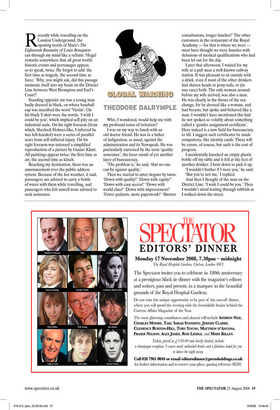R ecently while travelling on the London Underground, the opening words
of Marx’s The Eighteenth Brumaire of Louis Bonaparte ran through my mind like a refrain: ‘Hegel remarks somewhere that all great worldhistoric events and personages appear, so to speak, twice. He forgot to add: the first time as tragedy, the second time as farce.’ Why, you might ask, did this passage insinuate itself into my brain on the District Line between West Brompton and Earl’s Court?
Standing opposite me was a young man badly dressed in black, on whose baseball cap was inscribed the word ‘Victim’. On his black T-shirt were the words, ‘I wish I could be you’, which implied self-pity on an industrial scale. On his right forearm (from which, Sherlock Holmes-like, I inferred he was left-handed) were a series of parallel scars from self-inflicted injury. On his right forearm was tattooed a simplified reproduction of a picture by Gustav Klimt. All paintings appear twice: the first time as art, the second time as kitsch.
Reaching my destination, there was an announcement over the public address system. Because of the hot weather, it said, passengers are advised to carry a bottle of water with them while travelling, and passengers who felt unwell were advised to seek assistance. Who, I wondered, would help me with my profound sense of irritation?
I was on my way to lunch with an old doctor friend. He was in a lather of indignation, as usual, against the administration and its Newspeak. He was particularly exercised by the term ‘quality assurance’, the locus standi of yet another layer of bureaucracy.
‘The problem is,’ he said, ‘that no one can be against quality.’ Then we started to utter slogans by turns. ‘Down with quality!’ ‘Down with equity!’ ‘Down with easy access!’ ‘Down with world class!’ ‘Down with improvement!’ ‘Fewer patients, more paperwork!’ ‘Shorter consultations, longer lunches!’ The other customers in the restaurant of the Royal Academy — for that is where we were — must have thought we were lunatics with delusions of medical qualifications who had been let out for the day.
Later that afternoon, I waited for my wife at a pub near a well-known railway station. It was pleasant to sit outside with a drink, even if most of the other drinkers had shaven heads or pony-tails, or (in one case) both. The only woman around, before my wife arrived, was also a man. He was clearly in the throes of the sexchange, for he dressed like a woman, and had breasts, but spoke and behaved like a man. I wouldn’t have mentioned this had he not spoken so volubly about something called a ‘gender assignment certificate’. Here indeed is a new field for bureaucracy to till. I suggest such certificates be made compulsory, like identity cards. There will be errors, of course, but such is the cost of progress.
I accidentally knocked an empty plastic bottle off my table and it fell at the feet of another drinker. I bent down to pick it up. ‘I wouldn’t bother if I were you,’ he said. ‘But you’re not me,’ I replied.
And then I thought of the man on the District Line: ‘I wish I could be you.’ Then I wouldn’t mind wading through rubbish as I walked down the street.


























































 Previous page
Previous page